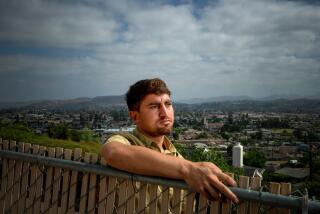Canada Said to Be a Haven for Somali War Criminals
- Share via
TORONTO — Canada’s openness to refugees from around the world has made it an unwitting haven for war criminals from Somalia, a respected Canadian television program says.
The report, aired Tuesday by the Canadian Broadcasting Corp. program “the fifth estate,” asserted that a “rat line,” or organized escape route for war criminals, has led from Somalia to Canada through the United States.
The broadcast highlighted the cases of three Somalis who allegedly participated in torture and other wartime atrocities in Somalia before fleeing to Canada and claiming they had been victims of persecution. Somalis interviewed accused the three of such atrocities as ripping out people’s teeth with pliers, fatally dragging people behind vehicles and setting people on fire.
The documentary said one of the most notorious of the “refugees” had been trained by the U.S. military under a special program for Somali army officers held at Ft. Leavenworth, Kan., in the mid-1980s.
James Bishop, the United States’ last ambassador to Somalia and now an officer in the State Department’s human rights bureau, said the CBC allegations of a semiofficial “rat line” organized by U.S. officials are “absurd.”
The CBC expose is likely to heighten existing Canadian opposition to U.S. foreign policy--and to further roil Canadian public opinion about their own country’s refugee policy.
Canada accepts a far greater percentage of its refugee claimants than any other country in the world. Yet the growing presence of foreigners in traditionally white Canada has lately caused tensions, and government officials have been increasingly complaining that this country is becoming the dupe of many Third World boot-strappers looking for a better deal.
The CBC documentary pointed out that the United States was a backer of Somali dictator Mohamed Siad Barre until his government collapsed and that all three of the alleged torturers had come to Canada after first arriving in the United States with valid travel documents.
In an on-camera CBC interview, Bishop said thousands had been killed during Barre’s crackdowns and it would have been impossible for U.S. intelligence officials to know the names of every low-level military officer involved in the bloodshed.
“People don’t come (to the U.S. visa office in Mogadishu) and advertise the fact that they have engaged in atrocious behavior,” he said. He argued that the United States had never knowingly granted an escape route to a Somali war criminal.
A predecessor to Bishop, former Ambassador Frank Crigler, told CBC that the U.S. government had trained Barre’s army officers in the arts of counterinsurgency and armed combat at Ft. Leavenworth. But he argued that exposure to American military practices would have made the Somalis “less abusive, less repressive” than they would otherwise have been.
“Certainly there were cases of brutality by individual military officers,” he added. “If some of those cases were carried on by officers who had (U.S. military) training, it’s entirely possible.”
In recent years, Canada has been particularly open-hearted toward the victims of repression in Somalia. Since its civil war and famine began, more than 90% of the Somalis who made it to Canada and filed for refugee status have been accepted.
Milton Best, a Canadian immigration spokesman, said “the vast majority” of Somalis arriving in Canada come through the United States. He said that if legislation now pending in the Canadian Parliament is passed, Canada will be able to send any bogus refugees--including war criminals--back to the United States.
More to Read
Sign up for Essential California
The most important California stories and recommendations in your inbox every morning.
You may occasionally receive promotional content from the Los Angeles Times.










